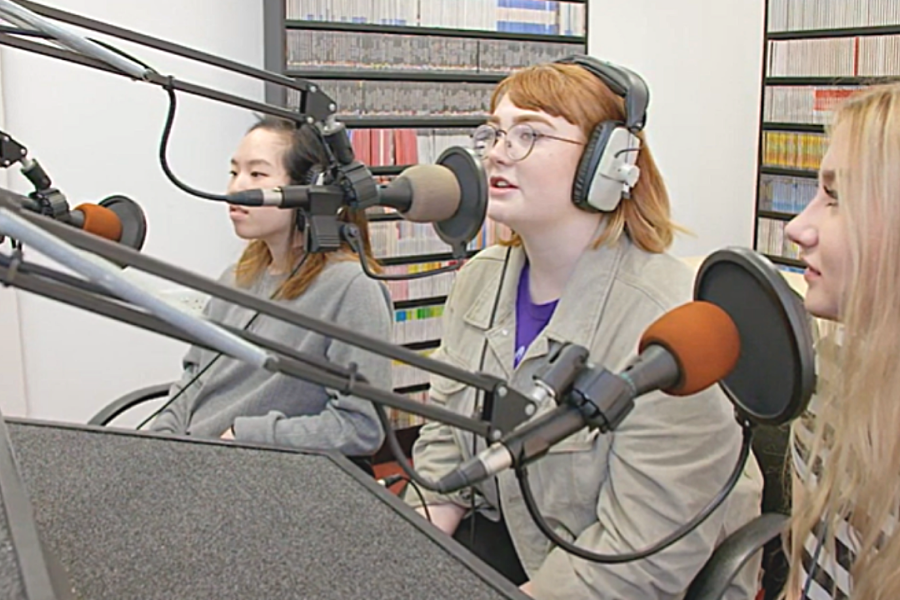About This Course
This exciting degree combines Media Studies and Production and covers television and radio journalism, print journalism, digital journalism and media practice. You will develop your ability to produce pieces of audio and visual work suitable for television, radio and the web. You will also learn essential skills and techniques to produce audio-visual material relevant to many of the creative industries. This course will equip you with a solid grounding in the theoretical, technical and practical skills required as a professional in these fields.
There has never been a more exciting time to be studying and practising media. Make a profession of your passion with this exciting degree course which is aimed at students who want to study media theory and media production in the fields of film, television, radio, digital media, advertising, journalism and public relations.
This exciting degree will equip you with a broad range of production skills within different areas of the media, including documentary filmmaking, radio, screenwriting and short film production. It will also provide a theoretical grounding and historical understanding of how the media operate.
Taught by leading analysts and practitioners, we will prepare you for the opportunities within the media and creative industries, and beyond. Media staff in the School are practising professionals and consultants, and have a range of research interests including advertising, media regulation, privacy, digital journalism, political communication, online journalism, professional writing, comics, visual culture, gaming, virtual worlds, global media, social networks, and documentary.
Nestled in a breathtaking location between the Snowdonia mountains and the sea, Bangor is the perfect place to experiment, create, make, think and analyse. The Media department is situated at the heart of the University campus, offering a close-knit and friendly community alongside the bustle of cafes, shops and city life. We have an award-winning radio station, Storm FM, as well as extremely successful clubs and societies in areas such as film making, games and drama, as well as two student newspapers.
Bangor is the site for a range of Creative Industries conferences, video conferences and events. It is a regular site for visiting creative writers, film-makers, journalists, designers, dramatists, new media makers and more, and encourages students to engage widely with their creative interests beyond the realms of the formal coursework.
Why choose Bangor University for this course?
- We specialise in many key areas: Professional Writing and Journalism; Media and Digital Communication; Film Studies; Creative and Media Practice.
- Our dedicated media studies and production facilities with editing suites and production equipment available to students.
- Our excellent links with local businesses in the creative sector.
- Final-year projects are often carried out in collaboration with a company.
Additional Course Options
This course is available with a Placement Year option where you will study for 1 additional year. The Placement Year is undertaken at the end of the second year and students are away for the whole of the academic year.
The Placement Year provides you with a fantastic opportunity to broaden your horizons and develop valuable skills and contacts through working with a self-sourced organisation relevant to your degree subject. The minimum period in placement (at one or more locations) is seven calendar months; more usually you would spend 10-12 months with a placement provider. You would normally start sometime in the period June to September of your second year and finish between June and September the following year. Placements can be UK-based or overseas and you will work with staff to plan and finalise the placement arrangements.
You will be expected to find and arrange a suitable placement to complement your degree and will be fully supported throughout by a dedicated member of staff at your academic School and the University’s Careers and Employability Services.
You will have the opportunity to fully consider this option when you have started your course at Bangor and can make an application for a transfer onto this pathway at the appropriate time. Read more about the work experience opportunities that may be available to you or, if you have any questions, please get in touch.
This course is available with an International Experience Year option where you will study or work abroad for 1 additional year. You will have ‘with International Experience’ added to your degree title on graduating.
Studying abroad is a great opportunity to see a different way of life, learn about new cultures and broaden your horizons. With international experience of this kind, you’ll really improve your career prospects. There are a wide variety of destinations and partner universities to choose from. If you plan to study in a country where English is not spoken natively, there may be language courses available for you at Bangor and in your host university to improve your language skills.
You will have the opportunity to fully consider this option at any time during your degree at Bangor and make your application. If you have any questions in the meantime, please get in touch.
Read more about the International Experience Year programme and see the studying or working abroad options on the Student Exchanges section of our website.
Course Content
Media studies at Bangor is unique in its close integration of academic and theoretical approaches with hands-on creative practice. Students in the School have the opportunity at all levels to combine a study of their chosen field with practice-based outcomes such as journalism, film and media/digital media production.
Media practice modules focus on three main areas: film and TV production, radio production and digital media more generally. Practical modules will be assessed both on the practical output and on the individual’s ability to reflect critically on their practice. Modules on the history and influence of the media, and media culture, are assessed by examinations and assignments, but assessment methods will vary according to the modules that have been chosen.
As you progress through the degree, much of your study will be done in small teaching groups with an emphasis on learning both group work skills and the ability to carry a piece of work through yourself from initial concept to completion.
The aim is to give you confidence, critical skills, strategic acumen, adaptability and potential to thrive in a range of media work environments and become a sough-after professional in a competitive field.
Modules for the current academic year
Module listings are for guide purposes only and are subject to change. Find out what our students are currently studying on the Media Studies and Production BA (Hons) Modules page.
Course content is for guidance purposes only and may be subject to change.
Facilities
Film, Media and Journalism Facilities
- Extensive loans service for equipment such as digital recorders, video cameras, stills cameras and more.
- Professionally equipped radio studio.
- Audio editing suites running Adobe Audition.
- Digital video edit suites running Final Cut Pro and Final Cut Express on Apple Macs.
- Auditoriums.
- Pontio arts and innovation centre, which includes a 200-seater cinema space with Dolby Surround Sound.
General University Facilities
Library and Archive Services
Our four libraries provide a range of attractive study environments including collaborative work areas, meeting rooms and silent study spaces.
We have an extensive collection of books and journals and many of the journals are available online in full-text format.
We house one of the largest university-based archives not only in Wales, but also the UK. Allied to the Archives is the Special Collections of rare printed books.
Learning Resources
There is a range of learning resources available, supported by experienced staff, to help you in your studies.
The University’s IT Services provides computing, media and reprographics facilities and services including:
- Over 1,150 computers for students, with some PC rooms open 24 hours a day
- Blackboard, a commercial Virtual Learning Environment, that makes learning materials available on-line.
Course Costs
General University Costs
Home (UK) students
- The cost of a full-time undergraduate course is £9,000 per year (2021/22 entry and 2022/23 entry).
- The fee for all placement, international, and sandwich years is £1,350 (2021/22 and 2022/23).
- More information on fees and finance for Home (UK) students.
International (including EU) students
Additional Costs
There are also some common additional costs that are likely to arise for students on all courses, for example:
- If you choose to study abroad or take the International Experience Year as part of your course.
- If you attend your Graduation Ceremony, there will be a cost for gown hire (£25-£75) and cost for additional guest tickets (c.£12 each).
Course-specific additional costs
Depending on the course you are studying, there may be additional course-specific costs that you will be required to meet. These fall into three categories:
- Mandatory Costs: these are related to a particular core or compulsory module that you’ll be required to complete to achieve your qualification e.g. compulsory field trips, uniforms for students on placement, DBS Check.
- Necessarily Incurred Costs: these may not be experienced by all students, and will vary depending on the course e.g. professional body membership, travel to placements, specialist software, personal safety equipment.
- Optional Costs: these depend on your choice of modules or activity and they are shown to give you an indication of the optional costs that may arise to make sure your choice is as informed as possible. These can include graduation events for your course, optional field trips, Welcome Week trips.
Entry Requirements
Offers are tariff based, 96 - 128 tariff points from a Level 3 qualification* e.g.:
- A Levels: General Studies and Key Skills not normally accepted.
- BTEC National Extended Diploma: MMM - DDM
- Cambridge Technical Extended Diploma: MMM- DDM
- City & Guilds Advanced Technical Extended Diploma (1080): considered on a case-by-case basis
- International Baccalaureate Diploma: accepted
- Access: pass required
- Welsh Baccalaureate: We will accept this qualification in conjunction with other level 3 qualifications
- T Levels: T Levels in a relevant subject considered on a case-by-case basis
- Extended Project Qualification: Points can include a relevant Extended Project (EPQ) but must include a minimum 2 full A-levels, or equivalent.
We are happy to accept combinations of the qualifications listed above, as well as alternative Level 3 qualifications such as City & Guilds, Access and Cambridge Technical Diplomas.
We also welcome applications from mature learners.
International Candidates: International Candidates: school leaving qualifications that are equivalent to A levels/Level 3 and/or college diplomas are accepted from countries worldwide (subject to minimum English Language requirements). More information can be found on our International pages.
*For a full list of accepted Level 3 qualifications, go to www.ucas.com.
General University Requirements
To study for a degree, you’ll be asked for a minimum of UCAS Tariff points. For a fuller explanation of the UCAS Tariff Points, please see www.ucas.com.
We accept students with a wide range of qualifications and backgrounds and consider each application individually.
All students need to have good basic skills and the University also values IT and communication skills.
As part of the University’s policy, we consider applications from prospective disabled students on the same grounds as all other students.
We also consider applications from mature students who can demonstrate the motivation and commitment to study a university programme. Each year we enrol a significant number of mature students. For more information about studying as a mature student, see our Studying at Bangor section of the website.
EU and International Students' Entry Requirements
For detailed guidance on the entry requirements for EU and International Students, including the minimum English Language entry requirement, please visit the Entry Requirements by Country pages. International applicants can also visit the International Education Centre section of our website for further details.
Bangor University offers International Incorporated Bachelor Degrees for International students whose High School qualification is not equivalent to the UK school leaving qualification. The first year (or Year 0) is studied at Bangor University International College, an embedded College on our University campus and delivered by Oxford International Education Group.
Careers
Studying media subjects at Bangor can be your launchpad to a great career. We have excellent links with theatre companies, newspapers and the television industry.
Our graduates have gone on to work in a range of roles, including: creative writing; professional writing and publishing; performance and the theatre (both on and behind the stage); print and/or broadcast journalism; as actors, presenters and in television programme production; advertising and marketing; radio (as presenters as well as in programme production); digital, web and new media production; multi-media industries; teaching; lecturing; and public relations.
Opportunities at Bangor
The University’s Careers and Employability Service provides a wide range of resources to help you achieve your graduate ambitions.
The Bangor Employability Award (BEA)
The BEA is a comprehensive online course that you can work through at your own pace, taking you through all the steps you need to take to explore, prepare and apply for your dream career.
Internships
Bangor University runs a paid internship scheme within the university’s academic and service departments.
Student Volunteering
Volunteering widens your experience and improves your employability. Find out more about volunteering on the Students’ Union’s website.
Foundation Year
A 'with Foundation Year' option is available for this course. Apply for Media Studies and Production (with Foundation Year).
What is a Foundation Year course?
If you don’t have the required qualifications for the degree-level course or are looking to re-enter education after time away from study, then a Foundation Year Programme might be the right choice for you.
The Foundation Year is an excellent introduction to studying this subject at university and will provide you with the knowledge, skills and confidence required to go on to study this course at degree-level.
When you have successfully completed the Foundation Year, you can progress on to the first year of this degree-level course.





